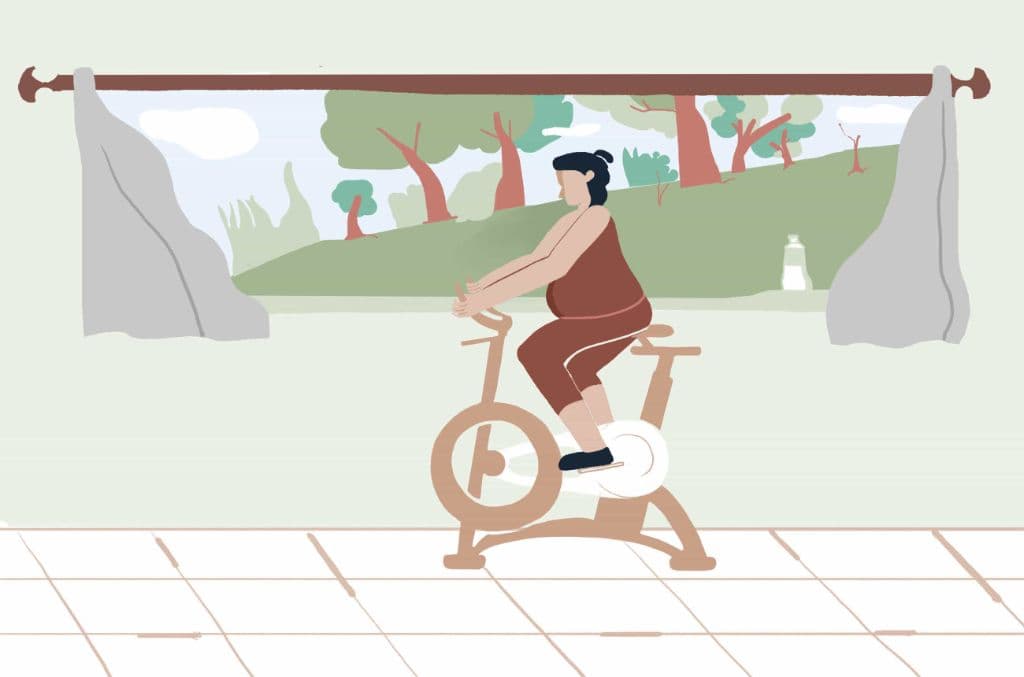The term pregnancy is used to describe the period in which a foetus develops inside a woman's womb. Pregnancy usually lasts for about 40 weeks, or just over 9 months, as measured from the last menstrual period to delivery. Pregnancy is a gentle and cautious state in a woman’s life.
Exercise offers several benefits to a healthy pregnancy
Exercise plays a key role in keeping a would-be mom fit and motivated and it’s important to be active during pregnancy as it has a lot of beneficial effects on the mother and the baby.
- Reduce backaches, constipation, bloating and swelling
- Boosts your mood and energy levels of new mothers
- Helps the mother sleep more soundly
- Prevent excess weight gain, especially in mothers with high baseline weight and fat percentage.
- Promote muscle tone, strength and endurance
- Reduces the risk of developing complications such as diabetes and high blood pressure in pregnancy.
In the last trimester of pregnancy, our body produces a hormone called Relaxin which loosens joints. So, maintaining balance may be difficult. Mothers should be very particular about what exercises they want to follow.
Tips for starting exercises during pregnancy
A common myth is that that exercising can put you at a risk for miscarriage in a normal pregnancy. Always consult your doctor before starting any new form of exercise during pregnancy.
- The more active and fit you are during pregnancy, the easier it will be for you to adapt to your weight gain. It will also help you cope with labour and get back into shape after the birth.
- Pregnancy is not the time to start a new form of exercise, particularly high intensity workouts. Make sure you start slow and listen to your body. If you feel exhausted or notice any of the warning signs, then stop that exercise and reach out to your healthcare provider.
- Remember all forms of exercise that you start during pregnancy must be approved by your gynaecologist who is aware of your health history. There are some conditions where it’s not advisable to exercise at all such as placental abnormalities. In that case, please don’t try out anything. Never start any new exercise in the third trimester of pregnancy.
- Make sure your clothing and footwear are suitable for your particular exercise.Make sure your shoes are well-supporting and that you don’t develop discomfort because of your clothing or footwear.
- Be mindful that you need to have a gap of 1 hour between your last meal and workout.
- Never workout on an empty stomach. Always hydrate yourself, keep yourself a bottle of water and some emergency snacks next to you.
- When exercising lying down or in a seated posture please be mindful that you could experience dizziness when getting up. Make sure the change in posture is gradual and that you can reach out for support when standing up.When ever exercising in a standing posture, have a chair or wall around for support.
- Even expecting mothers with older children/ toddlers should not lift kids that are heavier than 11kg or 25 lbs.
Recommended exercises during pregnancy
- Walking: Brisk walking gives a body workout and is easy on the joints and muscles.
- Swimming and water workouts: Swimming helps in keeping your weight within a healthy range and is gentle on the body. Water workouts use many of the body’s muscles. The water supports your weight so you avoid injury and muscle strain.
- Stationary bicycling: As your growing belly can affect your balance and make you more prone to falls, riding a standard bicycle during pregnancy can be risky. Cycling on a stationary bike is a better choice.
- Modified yoga and modified pilates: Yoga reduces stress, improves flexibility, and encourages stretching and focused breathing. There are prenatal yoga and Pilates classes designed for pregnant women. These classes often teach modified poses that accommodate a pregnant woman’s shifting balance. You also should avoid poses that require you to be still or lie on your back for long periods.
Activities to avoid while pregnant
- Exercises that involve sudden jumping or training of the abdominal muscles such as full crunches.
- High intensity training of any form - aerobic exercises, HIIT, skipping, tennis, squash.
- Workouts where you have a high risk of falls - trekking, some forms of dance, outdoor bicycling and racquet sports.
- Activities that could cause overheating or dehydration- long hikes, longer runs.
- Excessive stretching that strains your back.
- Saunas, hot yoga or hot tubs
Stop physical activity and consult a medical professional if any of the following occur:
Exercise in pregnancy is meant to boost the mother’s energy and add to her health positively. If at any point, a new mother feels exhausted and tired because of the exercise or it hampers her digestion or sleep, it should be discontinued or toned down to suit her needs.
- Persistent excessive shortness of breath that doesn’t resolve with rest
- Severe chest pain
- Regular and painful uterine contractions
- Vaginal bleeding
- Persistent loss of fluid from the vagina
- Pain or discomfort of any form.
Disclaimer - This information is provided for educational purposes and should not be construed as medical advice. Please consult with your healthcare practitioners before undertaking any changes in your diet or adding supplements.
ProactiveForHer is a digital clinic for women, offering accessible, personalized, and confidential health-care solutions. We offer products and services for out-patient health concerns of Indian women, across their lifetime - from puberty to pregnancy to menopause. To know more on the sexual and reproductive health of women, visit https://www.proactiveforher.com/

